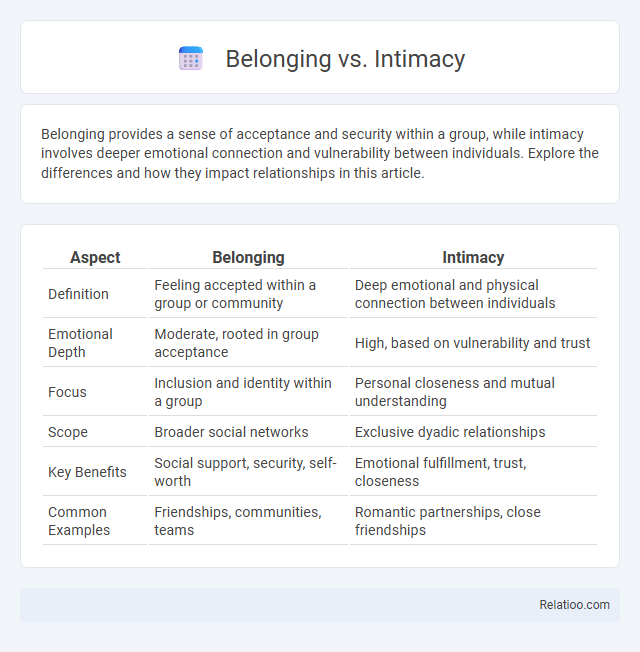Belonging provides a sense of acceptance and security within a group, while intimacy involves deeper emotional connection and vulnerability between individuals. Explore the differences and how they impact relationships in this article.
Table of Comparison
| Aspect | Belonging | Intimacy |
|---|---|---|
| Definition | Feeling accepted within a group or community | Deep emotional and physical connection between individuals |
| Emotional Depth | Moderate, rooted in group acceptance | High, based on vulnerability and trust |
| Focus | Inclusion and identity within a group | Personal closeness and mutual understanding |
| Scope | Broader social networks | Exclusive dyadic relationships |
| Key Benefits | Social support, security, self-worth | Emotional fulfillment, trust, closeness |
| Common Examples | Friendships, communities, teams | Romantic partnerships, close friendships |
Understanding the Concepts: Belonging and Intimacy
Belonging refers to the feeling of being accepted and connected within a group or community, emphasizing shared identity and mutual support. Intimacy involves deeper emotional closeness and vulnerability between individuals, fostering trust and personal connection. Understanding these concepts highlights that belonging addresses social inclusion, while intimacy centers on personal relational depth.
The Psychological Roots of Belonging
The psychological roots of belonging stem from an innate human need to form secure social bonds and feel accepted within groups, fostering emotional safety and identity validation. Research in social psychology highlights that belonging enhances mental health by reducing anxiety, depression, and loneliness, which distinguishes it from intimacy that demands deeper emotional exchange and vulnerability. Belonging operates on a fundamental level of group affiliation, contrasting with intimacy's focus on close, personal relationships, as both fulfill complementary but distinct psychological functions.
Defining Intimacy: More Than Emotional Closeness
Intimacy extends beyond emotional closeness to include trust, vulnerability, and mutual understanding, forming a deeper connection than mere belonging. While belonging provides a sense of acceptance within a group, intimacy fosters a unique bond characterized by open communication and shared personal experiences. This multifaceted nature of intimacy enriches relationships by promoting psychological safety and authentic self-expression.
Key Differences Between Belonging and Intimacy
Belonging refers to feeling accepted and valued within a group or community, emphasizing connection and social identity, while intimacy involves deep emotional closeness, trust, and vulnerability between individuals. You experience belonging through shared values and group membership, whereas intimacy requires personal disclosure and mutual understanding on a more individual level. These key differences highlight that belonging provides a sense of security in numbers, whereas intimacy establishes profound personal bonds.
How Belonging Shapes Our Social Identity
Belonging shapes our social identity by creating a sense of acceptance and connection within groups, influencing how we perceive ourselves and how others perceive us. Your need to belong drives social behaviors, reinforcing shared values, norms, and roles that define group membership. Intimacy, while fostering close personal bonds, complements belonging by deepening emotional connections but does not solely define your broader social identity.
The Role of Intimacy in Personal Relationships
Intimacy plays a crucial role in personal relationships by fostering deep emotional connections and mutual understanding between individuals, which strengthens relational bonds beyond mere belonging. While belonging provides a sense of acceptance within a group, intimacy involves vulnerability and trust that enable authentic self-expression and emotional support. Studies in psychology emphasize that relationships enriched with intimacy contribute significantly to individual well-being, resilience, and relationship satisfaction.
The Interplay: When Belonging and Intimacy Overlap
The interplay between belonging and intimacy reveals how social connections foster both a sense of group inclusion and deep emotional bonds. Belonging emphasizes acceptance within a community, while intimacy involves vulnerability and trust between individuals. When these elements overlap, relationships become profoundly supportive, enhancing personal well-being and reinforcing social cohesion.
Building Belonging in Communities and Groups
Building belonging in communities and groups fosters a strong sense of connection, trust, and shared identity among members. Your efforts to create inclusive spaces and encourage meaningful interactions enhance group cohesion and emotional safety. Prioritizing belonging cultivates commitment, collaboration, and long-term engagement, distinguishing it from intimacy which centers on personal closeness, and mere association based on belonging alone.
Cultivating Intimacy in a Digital Era
Cultivating intimacy in a digital era involves fostering genuine emotional connections beyond mere belonging, emphasizing deep personal engagement rather than superficial group affiliation. Digital platforms offer unique opportunities for meaningful one-on-one interactions through video calls, personalized messaging, and shared virtual experiences that build trust and vulnerability. Prioritizing empathy, active listening, and consistent communication strengthens intimacy, distinguishing it from the broader sense of belonging often found in online communities.
Finding Balance: Nurturing Both Belonging and Intimacy
Finding balance between belonging and intimacy requires recognizing their distinct roles in emotional well-being: belonging provides a sense of community and acceptance, while intimacy fosters deep, personal connections. Nurturing both involves creating environments where individuals feel safe, valued, and understood, allowing trust to build and relationships to deepen. Prioritizing open communication and vulnerability enhances intimacy, while inclusive social interactions strengthen the collective sense of belonging.

Infographic: Belonging vs Intimacy
 relatioo.com
relatioo.com